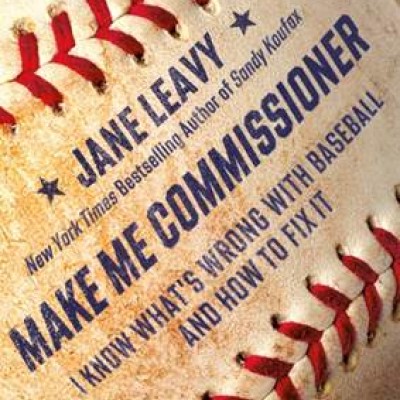As the Mets struggle to reach the playoffs and the Yankees take advantage of the soft September schedule to take aim at the A.L. East Division crown, baseball is — as it always seems to be — at a crossroads. Fans have little or no faith in the current MLB Commissioner and most of the owners — the keepers of the game that are an increasing source of frustration.
How to fix that? Noted author Jane Leavy thinks she knows… and she says so in her latest book, Make Me Commissioner: I Know What’s Wrong with Baseball and How to Fix It (Hatchette Book Group, Sept. 2025, 384 pp.). She took a few minutes to discuss baseball fandom an a sliver of what could help.
Gotham Baseball: It’s been said that for many fans, the best baseball is from when he or she was 10. How much of what you propose would get us closer to that time?
Jane Leavy: Lots. Baseball needs to grow a new generation of fans. Oldsters like me, who have supported the game since the Golden Era of the 1960s, aren’t long for the bleachers. Major League research shows that baseball fans become fans for life if they’re grown young. Teams need to fill the grandstands with ten-year-olds. They need to think the way ten-year-olds think. Like the grandson of a baseball-loving pal who watched the Savannah Bananas on YouTube and declared, “Looks like they fixed baseball.”
They need to heed the warning of the granddaughter of another friend who asked after four innings of baseball, “When does the game start?”
MLB doesn’t need to do as Top Banana Jesse Cole does but they do need to think the way he thinks. Fans first. Entertainment Always. That’s why I asked MIT professor Peko Hosoi and students in her Sports Analytics Lab to create a game for a hand-held device that kids can play at MLB ballparks, using the technology that is a way of life for them to interact with the game. “Beat the Bot” was a triumph at the Cape Cod League game where we tested it in August 2024. Kids refused to leave the game.
That’s why, when I’m commissioner, all kids age ten and younger accompanied by an adult will be admitted free. If grandma or grandpa bought that child a small hot dog, soda, ice cream and ballcap at Wrigley Park in 2023, it would have cost the Cubbies $4 million compared to the $21 million they paid Jason Heyward to play for the Los Angeles Dodgers. Aside from being the right thing to do, and a smart thing to do given MLB’s huge inventory of games and seats, it would be a Public Relations coup. Read the book for other ways to make baseball fun.

GB: How much does the idea that many of baseball’s stakeholders care only about the short term future of the game and dollars in hand now play into how the game is played/run today?
JL: There’s been a sea change in team ownership with the loss of families that owned, ran, and nurtured franchises not because they generated click bait but because it was a livelihood and a love. Not that they were all do-gooders, or good caretakers of the game or their players–they weren’t. But the corporatization of baseball, like so much of American industry, has exacerbated the estrangement between fans and the game.
GB: Which Commissioner before Jane Leavy was the best and why?
JL: No doubt: Bart Giamatti, the Yale president and professor of Renaissance literature, who had the soul of a poet and saw poetry in the game. No doubt he heard the music of the spheres in a 6-4-3 double play. The joust with Pete Rose over his gambling on baseball consumed most of Giamatti’s five-month reign as commissioner. Eight days after banishing Rose for life, Giamatti died of a sudden heart attack. How quaint that principled stance seems now.
His successor, Fay Vincent, wasn’t bad either, which is why he received an 18 to 9 vote of no-confidence in 1992 and resigned.
GB: Short of a Commissioner who worked for the game rather than the owners, how can meaningful change like the ones you suggest happen?
JL: Roy Eisenhardt, who ran the A’s for his father-in-law in the 1980s when the team still resided in Oakland, says labor relations in baseball resembles an old married couple still arguing about putting dirty socks in the laundry hamper. That’s too gentle a metaphor. Like George and Martha in Edward Albee’s acidic ode to marriage, “Who’s Afraid of Virginia Woolf,” players and management tear each other apart every six years at the conclusion of every Collective Bargaining Agreement.
A month before spring training camps opened this year, Commissioner Rob Manfred warned that a lockout in December 2026 was pretty much a sure thing and should be considered a new norm in labor relations. “Like using a .22, as opposed to a shotgun or a nuclear weapon,” he told Evan Drellich of “The Athletic.”
How is this a way to run a business? How do you say to fans, please come out to the ballpark, but don’t get too attached to the game or a team or a player because we’re going to shut it down.
Here’s a radical idea: let’s have fans go on strike, boycott opening day in 2026, to let players and management know what they think of this negotiating strategy.
GB: What would you suggest for fans who are fed up with the way MLB is run but they still love baseball?
JL: Hold on, I’m coming.


